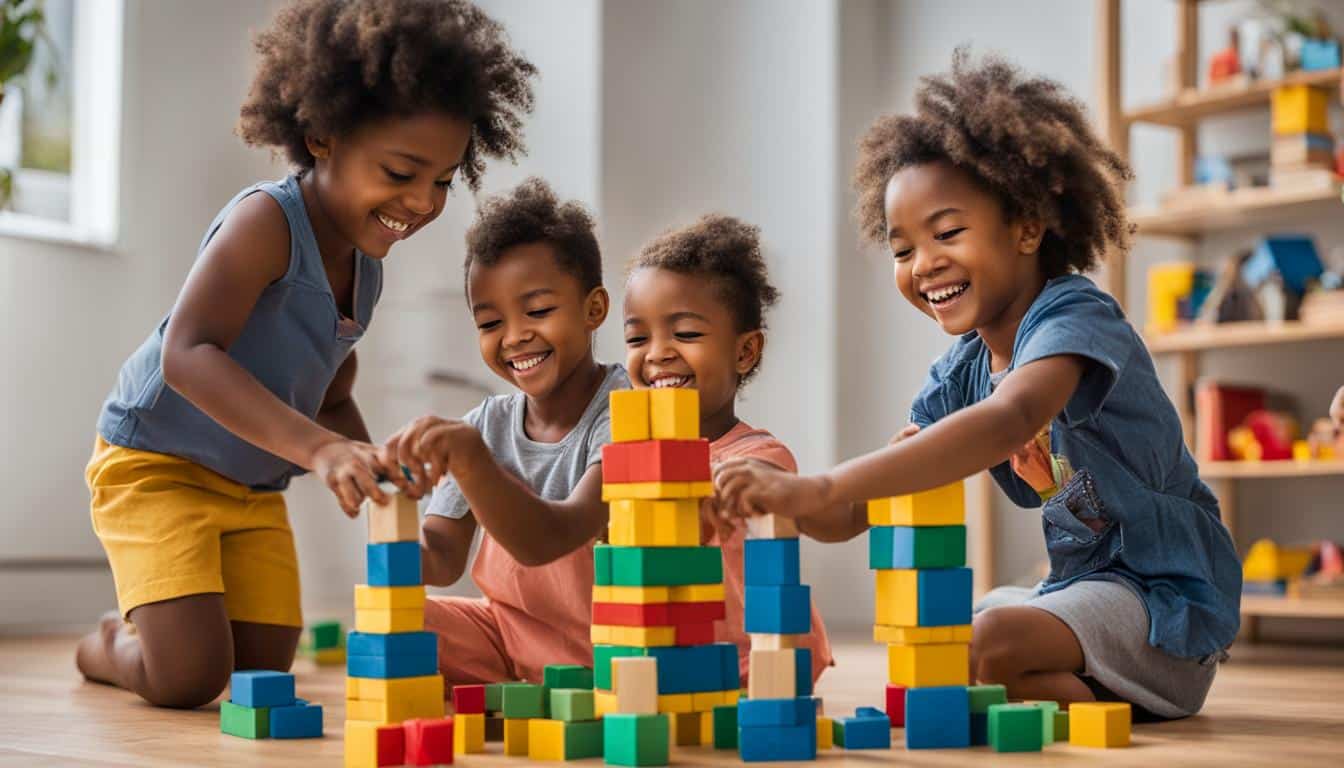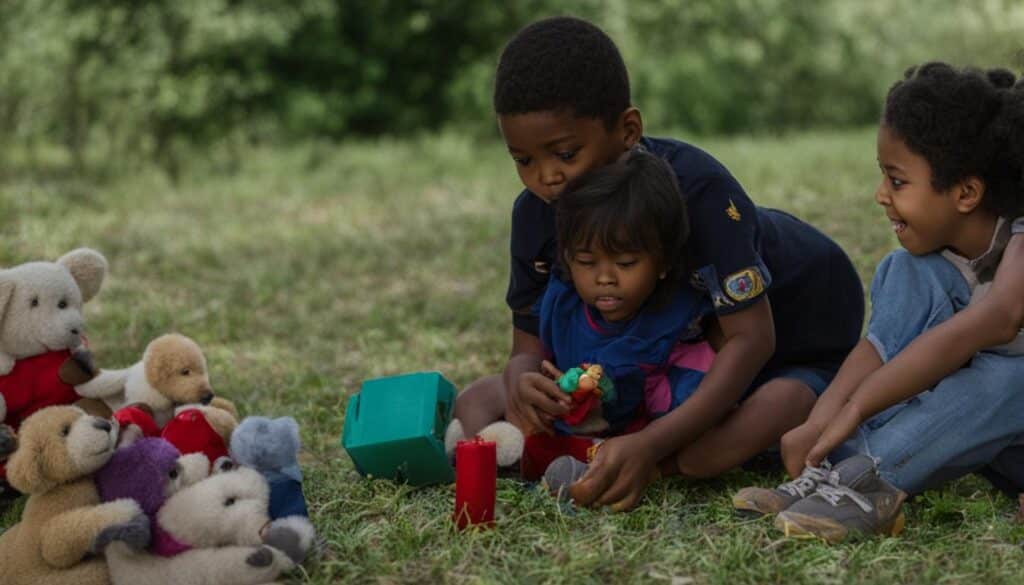
Nurturing Empathy in Children: A Parent’s Guide
As a parent, I understand the importance of nurturing empathy in children. Empathy is a skill that allows children to understand and feel with others, fostering positive relationships and effective communication. It is the foundation of crucial soft skills such as active listening, conflict resolution, and teamwork (Gialamas & Grigoropoulos, 2020).
Developing empathy in children is a significant aspect of their emotional growth and social awareness. By teaching empathy to kids, we can shape them into kinder and more compassionate individuals. In this guide, I will share valuable insights and strategies for fostering empathy skills in young ones, promoting their emotional intelligence and social development.
Empathy development begins at home, where parents play a central role in nurturing this essential life skill. By leading by example and implementing empathy-building activities, we can instill empathy in our children and help them become caring and considerate individuals.
Throughout this guide, we will explore various techniques and exercises to engage children in empathy-building experiences. From encouraging perspective-taking to discussing diverse stories, volunteering together to teaching active listening techniques, there are many effective strategies that can support empathy development in children.
As parents, our goal is to raise independent, resilient, and empathetic children. By fostering empathy, we are equipping them with the necessary skills to navigate the complexities of the world and build meaningful relationships.
Key Takeaways:
- Nurturing empathy in children is crucial for their emotional growth and social development.
- Empathy is a skill that allows children to understand and feel with others, leading to better communication and relationships.
- Parents play a central role in teaching empathy to kids and fostering empathy skills through active engagement and leading by example.
- Engaging children in empathy-building activities such as perspective-taking, reading diverse stories, and volunteering together can support empathy development.
- By nurturing empathy, parents are helping their children become compassionate, considerate, and resilient individuals.
The Power of Empathy
Empathy goes beyond understanding how someone feels; it is about truly experiencing their emotions and perspectives. When we empathize with others, we connect on a deeper level, fostering a sense of understanding and compassion.
Empathy is a powerful tool that allows us to navigate the complexities of a diverse world. By putting ourselves in someone else’s shoes, we gain insight into their experiences, challenges, and joys. This shared understanding helps build bridges between individuals and promotes harmonious relationships in all aspects of life.
“Empathy is the most powerful weapon humans have. With empathy, one understands in their core that all humans deserve the same love, understanding, and acceptance. It has the power to create a world where kindness and compassion prevail.”
Empathy is not just a soft skill; it is a life skill that carries numerous benefits. When we practice empathy, we cultivate kindness and compassion within ourselves, fostering a positive mindset and enhancing our overall well-being. Empathy also improves communication and strengthens our relationships, as it allows us to better understand and respond to the needs of others.
Moreover, empathy promotes social harmony and reduces conflicts by fostering tolerance and acceptance. It helps us break down barriers and bridge cultural, racial, and generational gaps. In a world that is increasingly interconnected, empathy is a crucial asset for building strong communities and promoting peace.
By recognizing the power of empathy and cultivating it in ourselves and our children, we can contribute to a more compassionate and empathetic society. Empathy has the potential to create a positive ripple effect, shaping the world around us one interaction at a time. Let us embrace the power of empathy and work towards a future filled with kindness, understanding, and harmonious relationships.
Nurturing Empathy in Children
Parents play a crucial role in nurturing empathy in their children. As a parent myself, I believe that leading by example is one of the most effective ways to teach empathy to kids. Children learn by observing, so it’s important for parents to model empathetic behavior in their daily interactions.
Encouraging perspective-taking is another powerful way to foster empathy in children. By helping kids understand different points of view, we can broaden their understanding of the world and cultivate empathy for others. Engaging in discussions about diversity, social issues, and global events can also nurture empathy and compassion.

One of my favorite empathy-building activities is reading and discussing diverse stories with my children. It not only exposes them to different cultures, perspectives, and emotions but also sparks meaningful conversations about empathy and the importance of understanding others.
Volunteering together as a family is another wonderful way to foster empathy in children. By actively engaging in community service or helping those in need, kids can develop a sense of empathy and compassion for others. They learn to put themselves in someone else’s shoes and understand the impact their actions can have on others.
Teaching active listening is an invaluable skill that promotes empathy in children. Encouraging them to truly listen to others, without interruption or judgment, helps them understand different emotions and experiences. Active listening also creates a safe space for open and honest communication, fostering empathy and deeper connections with others.
Discussing emotions openly is essential in nurturing empathy. By creating an environment where children feel comfortable expressing their own feelings and understanding the emotions of others, parents can help develop their empathy skills. We can encourage them to identify and validate their emotions while teaching them how to empathize with others.
Resolving conflicts peacefully is another key aspect of fostering empathy in children. By teaching them conflict resolution strategies that emphasize understanding and compromise, we empower them to navigate disagreements with empathy and respect.
“Empathy is about standing in someone else’s shoes, feeling with his or her heart, seeing with his or her eyes.”
In conclusion, nurturing empathy in children is a lifelong journey that begins at home. By leading by example, encouraging perspective-taking, engaging in empathy-building activities, teaching active listening, discussing emotions openly, and resolving conflicts peacefully, parents can lay the foundation for their children to become empathetic and compassionate individuals who contribute to a kinder and more harmonious world.
| Empathy-Building Activities for Children | Benefits |
|---|---|
| Reading and discussing diverse stories | – Develops cultural awareness and understanding – Sparks empathy and compassion – Expands perspective-taking skills |
| Volunteering together as a family | – Fosters empathy and compassion for others – Teaches the importance of giving back – Provides real-world experiences to understand different perspectives |
| Teaching active listening | – Enhances communication skills – Increases understanding of others’ emotions and experiences – Builds stronger connections and relationships |
| Discussing emotions openly | – Promotes emotional intelligence – Encourages empathy and understanding of oneself and others – Creates a safe and supportive environment for sharing |
| Resolving conflicts peacefully | – Teaches empathy and respect in disagreements – Builds problem-solving and conflict resolution skills – Fosters healthier and more harmonious relationships |
The Parenting Guide for Nurturing Empathy, Independence, and Resilience in Children
As parents, we all want to raise confident, compassionate, and resilient children who can navigate life’s challenges with grace and empathy. To help you on this journey, the “Parenting Guide for Nurturing Empathy, Independence, and Resilience in Children” is a comprehensive resource that provides valuable tips and steps to support your child’s emotional development and overall well-being.
This guide covers a wide range of topics relevant to parenting, including nurturing empathy, fostering independence, and promoting resilience in kids. It is designed to equip you with the tools and strategies needed to cultivate these essential qualities in your children.
Key Topics Covered in the Guide:
- Understanding the importance of empathy and its role in building meaningful connections.
- Practical ways to teach empathy and foster empathy-building activities at home.
- Steps to encourage independence in children while ensuring their safety and well-being.
- The significance of emotional intelligence in parenting and how to develop it in children.
- Strategies for promoting resilience and equipping children to overcome challenges.
The guide also offers insights and approaches for addressing common parenting challenges that arise in today’s world. Whether it’s dealing with bullying, navigating peer pressure, or managing technology use, this resource provides practical advice to help you guide your child through these situations.
Remember, parenting is a journey, and nurturing empathy, independence, and resilience in children is an ongoing process. By embracing the insights and strategies shared in this guide, you can provide your children with a strong foundation for personal growth and success in their relationships, both now and in the future.

Conclusion
Nurturing empathy in children is crucial for their social awareness and emotional intelligence. As parents, we have the power to shape our children into kinder, more compassionate individuals by fostering empathy skills. By teaching them to understand and feel with others, we are equipping them with the tools to build meaningful relationships and navigate the complexities of a diverse world.
Empathy is not just a soft skill; it is a life skill that has far-reaching benefits. It lays the foundation for important qualities like kindness, compassion, and effective communication. By nurturing empathy in our children, we are setting them up for success in both personal and professional relationships.
Our world is in dire need of empathetic individuals who can create positive change. By raising empathetic children, we are contributing to a kinder and more harmonious society. Empathy is what binds us together and helps us understand the experiences of others, leading to greater acceptance and unity.
FAQ
Why is empathy important for children?
Empathy is important for children because it helps them understand and connect with others. It promotes kindness, compassion, and effective communication skills.
How can parents nurture empathy in their children?
Parents can nurture empathy in their children by leading by example, encouraging perspective-taking, reading and discussing diverse stories, volunteering together, teaching active listening, discussing emotions openly, and resolving conflicts peacefully.
What are some empathy-building activities for children?
Some empathy-building activities for children include role-playing, engaging in community service projects, imagining being in someone else’s shoes, practicing acts of kindness, and participating in group discussions about emotions and experiences.
Can empathy be taught to kids?
Yes, empathy can be taught to kids. Parents can facilitate their children’s understanding of empathy through consistent modeling, communication, and engaging in activities that promote perspective-taking and emotional awareness.
How does nurturing empathy in children benefit their development?
Nurturing empathy in children benefits their development by enhancing their social awareness, emotional intelligence, and ability to build meaningful relationships. It equips them with important life skills that contribute to their success in personal and professional settings.